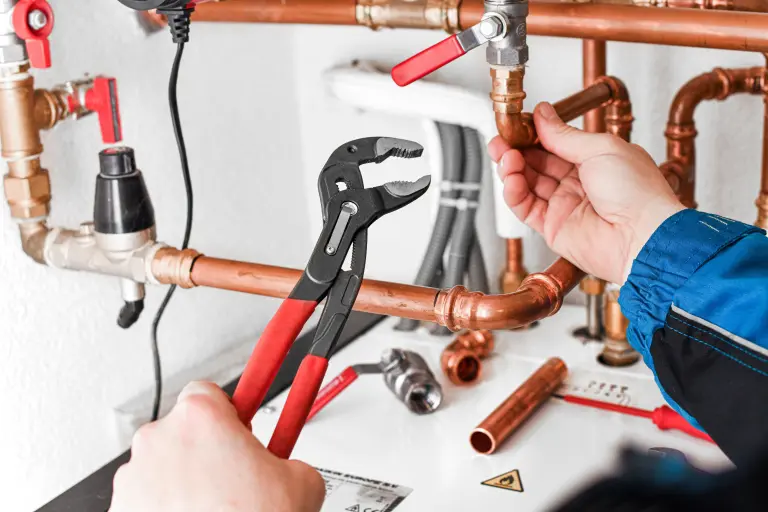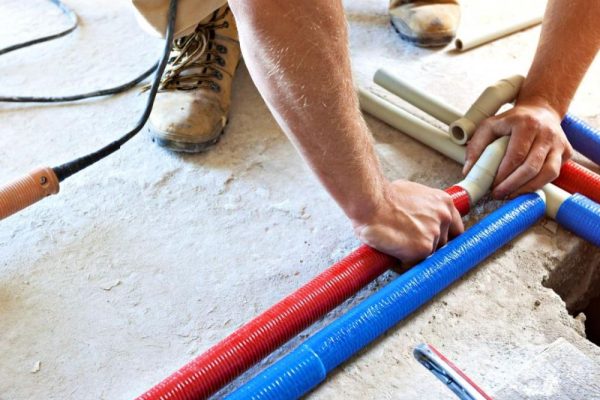Discover the way Repipe Specialists deliver reliable plumbing results
Discover Just How Repiping Provider Can Change Your Pipes System for the Better
Repiping solutions play a necessary function in preserving a home's plumbing system. They include replacing damaged or old pipes to improve total capability. Homeowners may see different indications indicating the demand for such services. Understanding these signs and the advantages of repiping can substantially boost water top quality and stress. Numerous continue to be uninformed of the different materials and processes included. Exploring these elements exposes real possibility of a freshly repiped system.
What Is Repiping and When Is It Essential?
Repiping refers to the process of changing damaged or old pipelines in a plumbing system, which is commonly required when the existing pipelines have deteriorated due to age, deterioration, or leakages. This procedure is vital for preserving the stability and functionality of a plumbing system. Gradually, pipelines can develop concerns that jeopardize water circulation and high quality, bring about potential health hazards and costly repair services.
Repiping might involve various materials, consisting of copper, PEX, or PVC, each chosen based upon certain needs and regional building regulations. Property owners may think about repiping when regular repair services are needed, water pressure is constantly low, or there are visible stained or foul-smelling water concerns. By resolving these issues via repiping, individuals can enhance the general efficiency of their plumbing systems, decrease the risk of future failures, and inevitably conserve on long-lasting maintenance costs.
Indications You Might Demand Repiping Providers
When plumbing problems begin to show up, such as consistent leakages, low water stress, or tarnished water, it might suggest the demand for repiping services. Home owners may see regular pipeline bursts or rust, which can result in considerable damage otherwise resolved without delay. Furthermore, if water discolorations show up on ceilings or walls, this can symbolize surprise leakages that call for immediate attention. Unusual sounds, like gurgling or banging pipelines, can likewise mean underlying issues.
An additional sign is the existence of mold and mildew or mold, often resulting from moisture caused by dripping pipelines. If the home has older plumbing, specifically galvanized steel or polybutylene pipelines, the risk of deterioration increases. If water high quality lessens, leading to undesirable smells or preferences, it's vital to consult a specialist. Recognizing these indications early can help homeowners stay clear of extra comprehensive damage and costly fixings.
Benefits of Repiping Your Home
Considering the age and condition of pipes systems, many homeowners locate that repiping deals substantial benefits. One of the primary advantages is improved water quality; older pipelines may nurture rust and impurities, while new products ensure cleaner, more secure water - Houston Repipe. Repiping additionally boosts water pressure, enabling a more rewarding experience when using faucets or showers, as old, rusty pipes typically limit circulation
In addition, repiping removes leakages, decreasing the threat of water damages and mold and mildew development within the home. This positive technique can result in reduced water costs, as house owners will certainly not be losing water with concealed leakages. In addition, modern piping products are extra durable and immune to future concerns, providing assurance. On the whole, repiping not only improves a home's plumbing system but additionally offers long-lasting cost savings and boosted building worth, making it a wise investment for house owners encountering plumbing challenges.
Different Sorts Of Piping Materials
Home owners should review various piping materials readily available on the market when thinking about repiping alternatives. Copper piping is understood for its resilience and resistance to rust, while PEX uses versatility and simplicity of setup. Furthermore, PVC pipeline offers certain applications, specifically in drain and airing vent systems.
Copper Piping Benefits
Although different products are readily available for pipes systems, copper piping remains a leading choice because of its many advantages. Popular for its toughness, copper can stand up to heats and is resistant to corrosion, ensuring a long life-span. Furthermore, copper has natural anti-bacterial residential properties, which assist maintain water high quality by protecting against the growth of harmful bacteria. Its pliability allows for simple installation, making it suitable for numerous pipes arrangements. Copper pipelines additionally have a high resale value, enhancing the overall well worth of a home. They are recyclable, making them an eco pleasant option. Overall, the mix of stamina, wellness benefits, and sustainability strengthens copper piping's credibility as a trustworthy selection for pipes systems.
PEX Pipe Benefits
In addition to copper piping, PEX (cross-linked polyethylene) has gotten popularity as a reliable choice in modern-day pipes systems. Its versatility allows for easier installation, particularly in limited areas, reducing the need for joints and fittings that can be susceptible to leaks. PEX is also immune to rust and scale build-up, which boosts its longevity compared to typical products. In addition, it can stand up to reduced temperature levels, making it ideal for numerous climates. The material is lightweight, making transport and managing easier. Moreover, PEX piping is less noisy than steel pipes, reducing water hammer sounds. In general, these advantages make PEX an appealing selection for house owners seeking reliable and sturdy pipes solutions.
PVC Pipe Applications
PVC (polyvinyl chloride) pipelines are extensively utilized in different pipes applications because of their versatility and cost-effectiveness. Typically used in domestic and industrial settings, PVC pipes serve in drainage systems, garbage disposal, and venting. Their lightweight nature facilitates simple installation, while their resistance to corrosion and chemicals guarantees longevity. Additionally, PVC is a superb choice for irrigation systems, as it can stand up to differing dirt problems and stress levels. In drinkable water supply, nevertheless, its use is less common because of regulatory restrictions. In spite of this restriction, PVC stays a prominent choice for lots of pipes jobs, using a reliable option for both new building and constructions and repiping efforts, making it a crucial material in modern pipes infrastructure.
The Repiping Process Explained
When a pipes system shows indicators of wear and tear, the repiping process ends up being vital to recover its performance and honesty. This procedure typically begins with a detailed analysis of the existing plumbing to recognize the degree of the damage. As soon as the evaluation is total, a plan is formulated to change old, corroded pipelines with new products, usually selecting in between copper, PEX, or PVC.

Lastly, the system undergoes screening for leakages and functionality. After confirming that every little thing runs correctly, the walls are fixed, and the area is restored to its initial problem, completing the repiping procedure.
How Repiping Can Boost Your Home's Worth
Repiping offers significant benefits that can enhance a home's total worth, particularly as prospective buyers increasingly look for trustworthy and contemporary pipes systems. Houses with outdated or worsening pipes often hinder possible buyers, that might stress over pricey repairs or health issues stemming from rust, leakages, or contamination. By purchasing repiping, more info property owners can eliminate these problems, providing a properly maintained residential or commercial property that meets modern standards.
Additionally, repiping can bring about enhanced water stress and quality, elements that substantially attract purchasers. A plumbing system that functions effectively and accurately frequently equates to decrease maintenance expenses, including to the home's appearance. Additionally, repiping can improve a home's aesthetic appeal by changing undesirable pipes with newer materials. Inevitably, a well-executed repiping project not just safeguards a home's facilities but also works as a solid selling point, making the property a lot more competitive in a busy actual estate market.
Choosing the Right Plumbing Specialist for Repiping
Picking the appropriate pipes specialist for repiping involves careful factor to consider of their qualifications and experience. Home owners need to also seek detailed cost estimates to ensure they comprehend the economic effects of the job. Making informed choices in these locations can cause a successful repiping experience.
Qualifications and Experience
Choosing a certified plumbing expert for repiping is essential to making sure a successful job. Credentials play a significant duty in figuring out a plumbing professional's experience; accredited professionals have met details training and regulatory criteria. Furthermore, qualifications from recognized companies can indicate sophisticated knowledge and skills in pipes systems. Experience is just as vital; skilled plumbers have most likely run into diverse difficulties, honing their analytic capacities. Homeowners ought to ask about previous jobs, asking for recommendations to gauge satisfaction levels among previous clients. An expert's knowledge with numerous products and methods, along with their capacity to remain updated on market innovations, even more boosts their integrity. Eventually, choosing a plumbing technician with strong credentials and ample experience promotes self-confidence in the repiping process and its results.

Expense and Price quotes
While assessing the expense of repiping solutions, home owners should consider different factors that affect rates. These factors include the type of products used, the degree of the pipes work needed, and the intricacy of the existing plumbing system. Furthermore, labor prices can differ significantly based upon the pipes expert's experience and location. Obtaining in-depth quotes from several contractors is crucial for making an educated choice. Home owners ought to additionally ask about guarantees and possible extra costs that might arise during the job. Ultimately, picking a credible new garbage disposal pipes expert that supplies clear pricing and extensive quotes will certainly help guarantee an effective repiping project, causing enhanced plumbing effectiveness and durability.
Often Asked Inquiries
How Lengthy Does a Typical Repiping Project Take to Total?
A normal repiping project generally takes in between one to 3 days to complete, depending on the size of the home and the complexity of the pipes system. Factors such as availability also affect the period.
Will I Need to Abandon My Home During Repiping?
Commonly, property owners may need to abandon their house during repiping, especially if comprehensive check here job is being done. The duration of the evacuation depends on the project's range, yet it frequently lasts a few days to a week.
Can Repiping Fix Low Tide Stress Issues?
Repiping can efficiently address low tide pressure problems by replacing old, rusty pipelines that limit flow (Repiping). This process enhances water distribution, ensuring enhanced stress and overall efficiency of the plumbing system throughout the home
Is Repiping Covered by Homeowner's Insurance coverage?
Repiping is frequently not covered by house owner's insurance policy, as it typically falls under upkeep rather than sudden damages. Nonetheless, certain plans may differ, so seeking advice from with the insurance policy provider is advised for quality.
What Should I Do to Plan for Repiping?
To get ready for repiping, property owners ought to clear the workspace, assurance access to plumbing components, go over the task with specialists, and recognize the possible effect on everyday routines and water schedule throughout the procedure.
Repiping services play an important function in keeping a home's plumbing system. Repiping refers to the process of changing damaged or old pipelines in a plumbing system, which is usually essential when the existing pipelines have actually weakened due to age, deterioration, or leaks. Selecting a qualified pipes professional for repiping is important to ensuring an effective project. These factors consist of the type of materials made use of, the extent of the plumbing job required, and the intricacy of the existing pipes system. A normal repiping task normally takes between one to 3 days to complete, depending on the size of the home and the complexity of the pipes system.